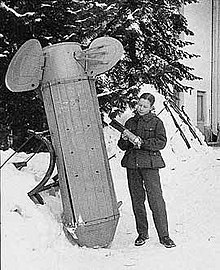
The RRAB-3 (Russian: ротативно-рассеивающая авиационная бомба, "rotationally dispersing aviation bomb"), nicknamed the Molotov bread basket (Finnish: Molotovin leipäkori), was a Soviet-made droppable bomb dispenser that combined a large high-explosive charge with a cluster of incendiary bombs. It was used against the cities of Finland during the Winter War of 1939–1940. The bomb consisted of a cylinder 2.25 metres (7.4 ft) long and 0.9 metres (3.0 ft) in diameter.
Described by journalist John Langdon-Davies in 1940:
As it fell from an aircraft, a small turbine on the nose turned to release a spring-loaded casing which, on opening, scattered 100 or more incendiary bombs; the main HE charge in the tail of the weapon continued to fall as a conventional bomb.[1]
Other descriptions make no mention of a main charge and instead describe a large cylinder with vanes at the back that open out when the weapon is dropped. The vanes cause the bomb to spin and this has the effect of opening the sides and scattering the submunitions by centrifugal force.[2]
The name came from the propaganda Molotov produced during the Winter War, mainly his declaration on Soviet state radio that incendiary bombing missions over Finland were actually "airborne humanitarian food deliveries" for their "starving" neighbours.[3][4][5][better source needed] As a result, the Finns sarcastically dubbed the RRAB-3 incendiary cluster bombs "Molotov bread baskets" (Finnish: Molotovin leipäkori) in reference to Molotov's propaganda broadcasts.
This description seems to have become common currency among the British public in 1940.[6] During the Bristol Blitz, the locals dubbed a similar German device "Goering's bread basket".[7]
The Soviets had several versions: RRAB-1, RRAB-2 and RRAB-3, with capacities of 1000, 500 and 250 kg respectively, each capable of holding various types of submunitions including HE, incendiary, and chemical.
The bomb consisted of a cylinder that was 2.25 meters long and 0.9 meters in diameter.
- ^ Langdon-Davies, John (June 1940). "The Lessons of Finland". Picture Post.
- ^ "Big Russian Bomb Holds Sixty Little Ones". Popular Science. July 1940. Archived from the original on 12 April 2012. Retrieved 16 April 2007.
- ^ Casselman, Bill (2017). Word stash. Trafford. ISBN 978-1-4907-8494-6. OCLC 1007046570.
- ^ "Suomessa on yhä kolme aitoa Molotovin cocktailia". is.fi. Ilta-Sanomat. 16 April 2016. Archived from the original on 24 March 2023. Retrieved 20 April 2022.
- ^ The Second Book of General Ignorance, Faber and Faber, 2011, p. 101, ISBN 978-0-571-26965-5
- ^ Olive Mary Barrow. "Molotov Breadbasket in Southwick, West Sussex". WW2 People's War (BBC). Retrieved 14 February 2018.
- ^ Richard Harris. "A Little Lad's War: Bath Blitz, War Effort, Father Preparing Civil Servants for Germany". WW2 People's War (BBC). Retrieved 14 February 2018.